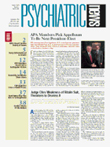Biographical Statement
I grew up in a large family in the last days of India’s freedom movement. My family was also in transition, moving from a village to a city when I was of school age. The years of college were spent in honing my public speaking skills and leading student movements.
The discovery of psychiatry and psychoanalysis led me to come to the U.S. in 1964 for training. After my residency at Northwestern, I returned to India, but came back to marry Alice Meara in 1970.
I began my career as a community psychiatrist, serving an African-American, Latino, and middle-European neighborhood, at the Illinois State Psychiatric Institute in its halcyon days, and joined the faculty of the University of Illinois. The next assignment was to direct services of the Chicago metropolitan area for the state of Illinois. Here I developed my skills in dealing with deinstitutionalization, community-based services, and, of course, politicians, the press, and the police.
From the late 1970s on, I have been with the Veterans Health Administration, the first as the chief of psychiatry and then as the chief of staff. My academic involvement from then on became much more intense, particularly in social and cultural psychiatry. All throughout my career I have maintained a small private practice.
In my involvement with the Illinois district branch and APA, I have applied my knowledge and understanding of organized mental health delivery systems, of the sociocultural issues, of minorities and immigrants, and of medical ethics to my work in the Assembly and the components.
We have lived in a suburb of Chicago for the last 25 years where we raised our two daughters; Reshma, a social worker who now directs a women’s shelter in Chicago, and Natasha, a graduate student in anthropology at Duke.
Candidacy Statement
Three issues are at the front of my agenda: improving access, organizational responsiveness, and fiscal responsibility.
Improving Access
• The single overriding objective must be to improve access to care. Psychiatric patients have been systematically denied access through discriminatory insurance practices. Managed care companies are in actuality managing demand and containing cost. Publicly financed services have also seen considerable erosion. The three pillars of health care are costs, access, and quality. Changing one invariably affects the other two, and that is exactly what has happened to both access and quality as the health care delivery systems address costs. The imbalance produced must be redressed.
• Bias against psychiatric care has been built into health insurance benefits, thus impeding access. We have achieved parity through legislation in more than half the states. The work of the JCGR and the Commission on Public Policy, Litigation, and Advocacy (of which I am a member and am learning a lot about DBs) must be augmented to shore up district branch resources.
• The most pernicious effect of discriminatory insurance practices has been devaluation of psychotherapy. Rationing out therapy plants seeds of suspicion of its efficacy in our patients. If the trend were to continue, in a generation or so, there may be no teachers to help medical students learn to relate to patients in a psychologically sensitive manner.
• Psychologists aspiring to prescribe psychoactive agents make light of the immense complexity of the human physiology and unwittingly devalue psychotherapy. They do so in the name of access, and as a profession, we must address the unmet needs of underserved populations.
• Stigma attached to psychiatric illnesses is a barrier. Our professionalism demands that we commit not only to our individual patients but also to larger communities. Advocacy of patients and populations and public education must claim our attention (work of the JCPA and practice guidelines).
Organizational Responsiveness
• There is a sense that there is a disconnect between the center of APA and the DBs and individual members: one explanation suggested for loss of membership. There is a need to repair a perceived lack of responsiveness of the governance structure. Perhaps the leadership has failed in effectively communicating its successes. There is no excuse for an information gap.
The recent reorganization will help in directly assisting the DBs through revenue sharing and support of their education and legislative efforts, and better align the objectives of the center with those removed from it. To facilitate greater responsiveness to member concerns and their access to governance must be priorities.
Fiscal Responsibility
• The demand for resources is ever-increasing, especially for legislative initiatives. The Assembly has taken a lead in paring down its expenses, but we may have to do more. No line item should be untouchable, and the message must be carried to the Board. Every function, including councils and components, must be freshly examined, setting expectations for work products and performance standards. WORKING FOR APA OUGHT NOT BE A PRIVILEGE, IT MUST BE AN OBLIGATION.
• The Assembly should find ways to a speedier resolution of its legislative agenda and push for mechanisms that bring to early resolution its action items. We must curtail our enthusiasm for new ventures. This does not mean that we withdraw from battle, but that we choose the battles carefully.
• Finally, I see myself as a custodian of tradition and an initiator of change. In my life I have straddled two cultures, and in my work I best function as a bridge between the old and the new, between disciplines, and between disparate elements. I am ready to apply my skill to the many challenges facing us.
I ask for your support.

